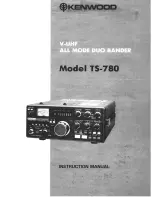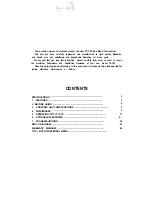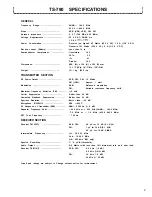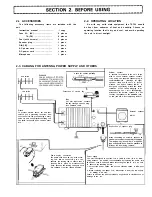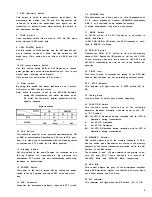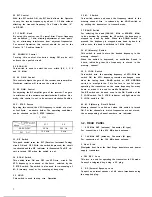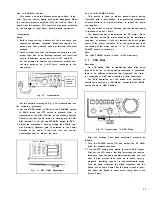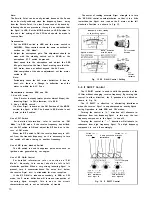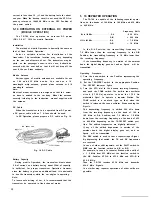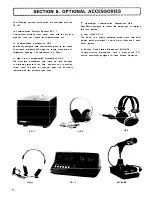
5-l. OPERATING MODES
The TS-780 can be operated in the following modes by
using the MODE switch.
CW - Transmission and reception of Morse Signals (Al ).
FM - Transmission and reception of FM Signals (F3).
USB - Upper side band transmission and reception (A3j).
USB is normally used on 144 and 430 MHz bands.
LSB - Lower side band transmission and reception (A3j).
switch. When either switch is pressed for 0.5 second or
longer, the frequency is shifted about 0.5 second inter-
vals.
2. Turn the AF GAIN control clockwise and noise or Signal
will be heard from the speaker. Adjust the control for
suitable level.
(To eliminate the noise which is heard when Signal is ab-
sent, turn the SQL control.)
3. Turn the VFO dial slowly until the Signal is heard most
5-2. FM MODE
Reception
Set the knobs and switches as shown in Fig. 9, then
proceed as follows: When the shift switch is at SIMP (in
simplex Operation), the mode switches FM-A and FM-B
operate in the same way so either of which may be used.
(Refer to 5-l 4).
1. T u r n t h e P O W E R s w i t c h O N . T h e meter a n d diqital
clearly while observing the “S” meter deflection.
4. Set the meter switch to ALC/CEN and turn the VFO dial
until the meter is centered while receiving the Signal of
the other Station. When the meter pointer indicates the
Center Position, it means that the transmit frequency
has tuned to the receive frequency. Set the meter
switch to RF/S. Since the IF band is wide in FM mode, a
slight deviation of frequency does not affect the recep-
display are illuminated to indicate the power is on. The
digital display indicates 144.000 MHz and VFO A.
Select your operating frequency band by pressing the
DOWN (or UP) BAND switch. The frequency is shifted
tion. In transmitting Operation, however, the other Party
may be using a fixed channel, so it is advisable to set the
meter in the Center Position (Zero-in) by adjusting the
VFO dial knob.
*
b a n d b v b a n d a t each o r e s s o f t h e D O W N (or UP)
Zero-in means that your transmit frequency coincides
.~
precisely with the receive frequency.
“0” (center position)
A
“0” (Center position)
Turn fully counterclockwise
,fCfully c o u n t e r c l o c k w i s e
Turn fully counterclockwise
fullycounterclockwise
Turn fully clockwise
F M
OFF
T o 4 3 0 MHz ANTENNA
T o 1 4 4 M H z A N T E N N A
Pre-setting
for Reception
Use of RIT Switch
The RIT (Receiver incremental Tuning) switch is used to
shift the receive frequency by about
1.5 kHz without
affecting the transmit frequency (the indication of digital
display remains unchanged).
When the receive frequency is offset, turn on the RIT
switch (the RIT indicator will light) and turn the RIT control
so that the transceiver is tuned in the frequency.
Note that the receive frequency is offset from the
transmit frequency when the RIT switch is turned on, so
the switch must be set to OFF after QSO.
Use of RF GAIN Control
This is used to adjust the receiver
RF Stage gain. Normal-
ly, leave it fully clockwise. for a very strong incoming
Signal, turn it counterclockwise. If there is a strong Signal in
the vicinity of your operating frequency, lower the RF gain
to reduce intermodulation interference.
1 1

